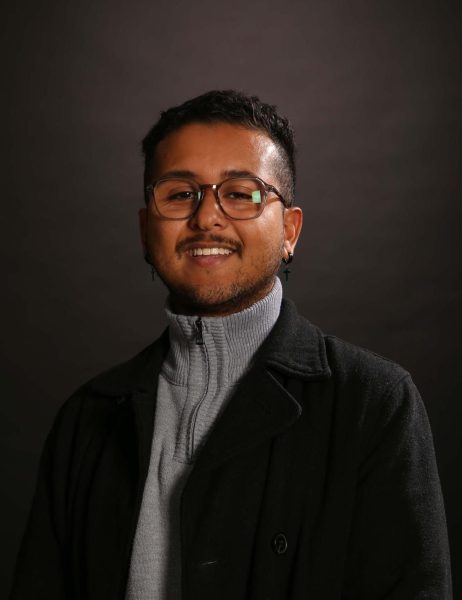

Ayanna King holds a Zeta Phi Beta sorority book during a meet-and-greet for San Francisco State clubs and organizations at the Quad in San Francisco Calif., on Monday, Jan. 30, 2023. (Benjamin Fanjoy / Golden Gate Express)
Jan 31, 2023
The first week of a new semester can be stressful. Whether it is your first time on campus or 10th time, it can be helpful to know what resources and groups are available to help you through your experience at SF State.
The first table to likely greet you on campus this week may be the Gator Welcome Committee. The committee has multiple service desks throughout the campus that offer various resources to all students such as reusable water bottles, snacks, maps and directions to classrooms.
“(The committee) has not always been a thing on campus,” said Sophie Clavier, Interim Dean of College of Liberal & Creative Arts. “This effort was created in response to the pandemic and the new wave of students who have been a part of the SF State community but may be their first time on campus.”
“We realized post-pandemic that it was important to have a face to face interaction with students,” Clavier said. “We don’t have a lot of freshmen in the Spring, so we want the students to know who we are and that we care for them outside of the campus.”
The welcoming committee has mainly been powered by the office of the president, but is still credited to the campus as it is “a community effort.”
Multiple student-led organizations were seen gathered throughout the lawn area outside the Cesar Chavez Student Center. Returning organizations such as The Latinx Film Club, Nu Mu Chapter of Zeta Phi Beta Sorority Incorporated and some new clubs like Hoods to Woods and Turning Point USA were out tabling Monday to share their goals and spread knowledge on their organizations to SF State students.
The Latinx Film Club is currently the only active Latinx student organization at SF State this semester. Aside from their main focus of film, their goal is to hold more cultural events such as Día de los Muertos that was held last semester and Banda night to highlight the culture and community. The Latinx Film Club is currently working on three scripts ready for production that are aimed towards increasing Latinx representation in film and are in the works to create a film festival.
“The Latinx community is not represented in film and our goal is to make these films unite our community while making them (community members) feel supported,” said Hanna Maaloul, Vice President of the Latinx Film Club.
One of the sororities tabling, Nu Mu Chapter of Zeta Phi Beta Sorority Incorporated is one of the historical nine Greek Black letter organizations, also known as “The Divine Nine.”
The sorority is part of National Pan-Hellenic Council (NPHC), a community conscious action oriented organization working their core principles, “scholarships, service, sisterly love and finer womanhood.” Some events held by Zeta Phi Beta Sorority Incorporated are aimed towards supporting black community members. In the month of February, the sorority will be holding events for Black Men’s Appreciation, Black Women’s Appreciation and Black Elders Appreciation.
“We’re working towards bettering our community here on campus for Black students and for everyone in general,” said Ausha Bolds, Phylacter for the Nu Mu Chapter of Zeta Phi Beta Sorority Incorporated. “Because if we are working with our community, then we can expect success for our community.”
A majority of their work this semester will be continuing the 40 year long collaboration with March of Dime, a non-profit organization aimed towards providing support for “moms, babies and families.” Their goal is to donate $1,000 by the end of the year.
Students throughout SF State rely on one another to create research projects for the future. Charles Forehand Holmes and Genievive del Mundo are students working on a six month project, “Hoods to Woods, Reclaiming Nature,” which primarily researches transitional age 18-26 of the black, indigenous and people of color community members and the effects of the cortisol stress hormone and telomere links.
“Through this research project, our goal is to work directly with the BIPOC community,” Holmes said. “Because we feel like people in that community have to take an extra step especially when it comes to managing stress.”
“We’re starting it this semester, so we will take college students out in nature once a month and have them connect with nature to relieve some of the stress hormones,” Holmes said. “While we take people on these walks, once the walk is over we will confirm with the participants if it is okay to collect biospecimen samples such as hair and saliva to test telomere levels which show the true age of your cells.”
Be sure to check out some of the student organizations tabling the first week of classes outside the Cesar Chavez Student Center.

